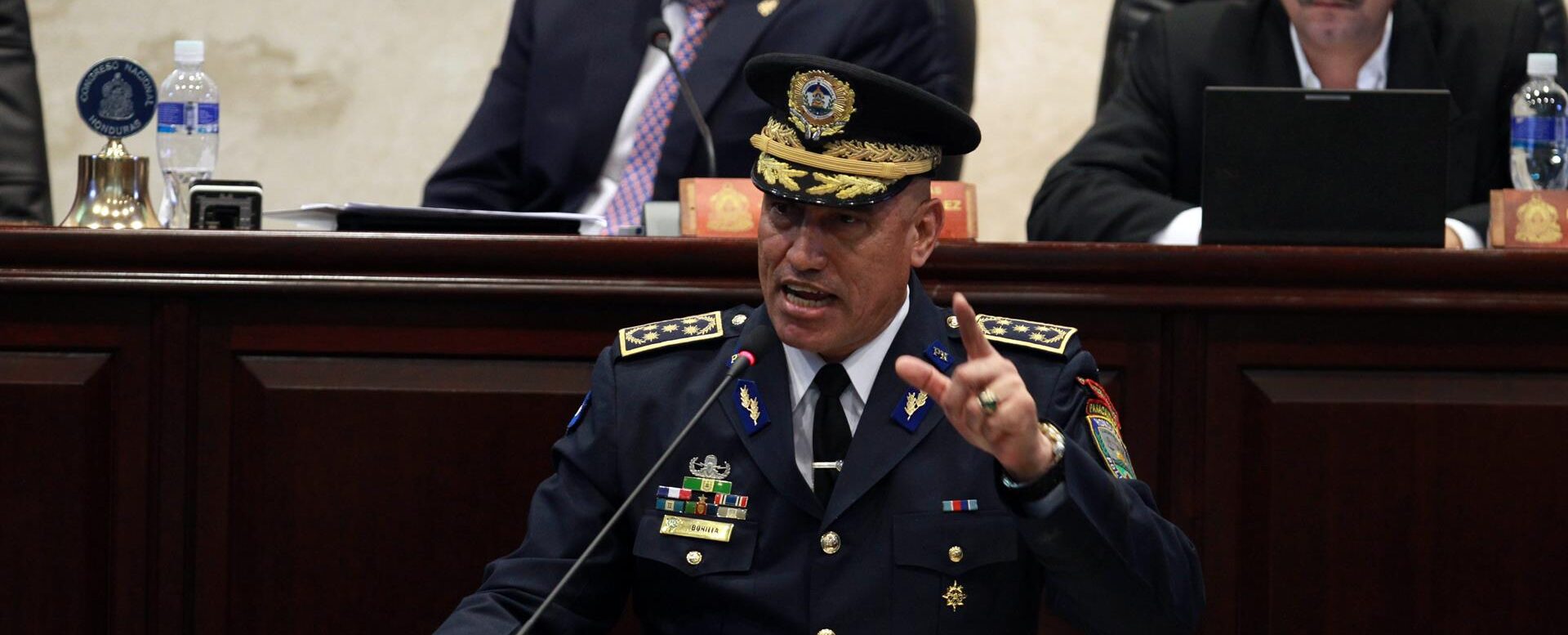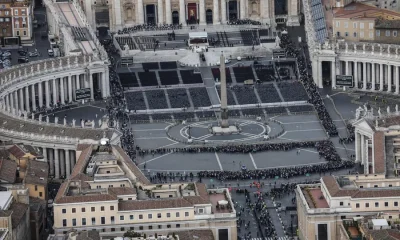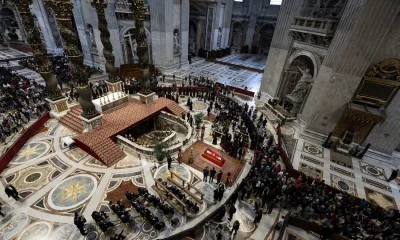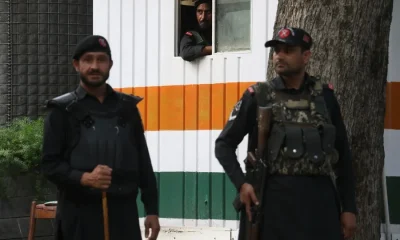Central America
Arrest of former Honduran police chief sought by US

AFP
Honduras’ former national police chief Juan Carlos Bonilla, who is sought by the United States for drug trafficking, was detained Wednesday, authorities said.
“‘El Tigre’ Bonilla was captured,” police spokeswoman Rebeca Martinez told AFP, using his nickname and stating that he was arrested by police special forces at a tollbooth.
Bonilla, who was chief of police from 2012 to 2013, had been named as a “co-conspirator” during the US drug trafficking trial of Tony Hernandez, the brother of former Honduran president Juan Orlando Hernandez.
Bonilla’s arrest comes only three weeks after that of the former president, who is also sought by American authorities for drug trafficking.
The 53-year-old ex-leader, who left office after eight years on January 27, is accused of having facilitated the smuggling of some 500 tons of drugs — mainly from Colombia and Venezuela — to the United States via Honduras since 2004.
In turn, he allegedly received “millions of dollars in bribes… from multiple narcotrafficking organizations in Honduras, Mexico and other places,” according to a document from the US Embassy in Tegucigalpa.
The ex-president’s brother, a former Honduran congressman, was given a life sentence in the United States in March 2021.
Washington requested on February 14 that Juan Orlando Hernandez, also named a “co-conspirator” in his brother’s case, be extradited to the United States to face charges.
The former president was arrested and placed in a prison at the Special Forces headquarters, in the east of the capital Tegucigalpa, but has requested house arrest while the legal process works out.
Central America
Nicaragua’s Ortega and Murillo Mourn Pope Francis, Acknowledge ‘Difficult’ Relationship

Nicaraguan President Daniel Ortega and Vice President Rosario Murillo, who also serve as co-leaders of the country, expressed their condolences on Monday following the death of Pope Francis, acknowledging that their relationship with the late pontiff had been “difficult” and “troubled.” Nicaragua officially suspended diplomatic ties with the Vatican during his papacy.
“Our relationship, as Nicaraguans who are believers, devoted and faithful to the doctrine of Christ Jesus, was difficult and troubled—unfortunately shaped by adverse and painful circumstances that were not always understood,” Ortega and Murillo wrote in a message of condolence.
“Despite the complexity and hardships, despite the manipulation we all know occurred, despite everything, we kept our hope alive through Christian faith,” they continued. “We understood the distance, and above all, the complicated and strained communication that prevented better relations. We also recognized the confusion caused by strident voices that disrupted any attempt at genuine interaction.”
Pope Francis had previously compared the Ortega regime to communist dictatorships and even to Hitler, a remark that further strained relations between Managua and the Holy See.
Central America
Cardinal Rodríguez to Attend Funeral of Pope Francis: “He Was Very Dear to Me”

Honduran Cardinal Óscar Andrés Rodríguez announced on Monday that he will attend the funeral services of Pope Francis, who passed away at the age of 88 at his residence in Casa Santa Marta due to a stroke.
“We will be there throughout the novena and then, God willing, at the burial,” Rodríguez said in a phone interview with HRN Radio in Tegucigalpa, apparently calling from Spain.
He added that the last time he saw Pope Francis was in October 2024, during and at the end of that year’s synod, and that they remained in contact through email. “Sometimes, the Pope would even call me,” said Rodríguez, who was born on December 29, 1942, and was made a cardinal by Pope John Paul II on February 21, 2001.
Rodríguez expressed deep sorrow over the passing of Pope Francis, saying: “He was a very dear person to me.”
However, he also shared a message of hope, pointing out that the Holy Father passed away during Easter: “This is a sign. He gave his life completely like the Lord Jesus, and though he died, we believe in faith that he has risen, now with Christ in eternal life.”
Rodríguez, who for ten years coordinated the Vatican’s Council of Cardinals, was one of the eight cardinals selected by Pope Francis to help govern the Catholic Church and reform the Roman Curia.
In January 2023, upon turning 80, Rodríguez stepped down as Archbishop of Tegucigalpa, and Pope Francis appointed Spanish priest José Vicente Nácher Tatay as his successor.
Central America
Senator Van Hollen Meets with Deported MS-13 Member in El Salvador; Trump and Bukele React

U.S. Democratic Senator Chris Van Hollen, representing the state of Maryland, held a meeting in El Salvador with deported MS-13 gang member Kilmar Ábrego García, a member of the criminal group classified by the U.S. government as a terrorist organization.
“Kilmar Ábrego García, miraculously resurrected from the ‘extermination camps’ and ‘torture chambers,’ now sipping margaritas with Senator Van Hollen in the tropical paradise of El Salvador!” wrote President Nayib Bukeleon X (formerly Twitter), sharing photos of Van Hollen, Ábrego García, and a lawyer sitting together at a Salvadoran hotel.
The deported gang member is seen wearing a plaid shirt and a flat-brimmed cap, seated at a table with glasses and coffee cups. The senator also shared images of the meeting on his own social media accounts.
Bukele reaffirmed that Ábrego will remain in El Salvador and will not be returned to the United States.
“Now that his health has been confirmed, he has earned the honor of remaining under the custody of El Salvador,” Bukele added.
Former U.S. President Donald Trump criticized the senator’s meeting with Ábrego on Truth Social, calling Van Hollen “a fool” for advocating for Ábrego’s return to the U.S.
-

 International4 days ago
International4 days agoPope Francis and Trump, a relationship of disagreements marked by migration
-

 International4 days ago
International4 days agoWithin Francis’ private wake: respect and prayer for the deceased pope
-

 International4 days ago
International4 days agoEl Salvador formalizes the proposal for the exchange of Venezuelan deportees, according to Bukele
-

 International4 days ago
International4 days agoFrom the transfer of the coffin to the funeral, three days to say goodbye to Pope Francis
-

 International4 days ago
International4 days agoTrump’s emissary will visit Russia this week for consultations on the arrangement in Ukraine
-

 International4 days ago
International4 days agoA very heterogeneous and divided conclave will elect the new pope
-

 International4 days ago
International4 days agoCardinal Becciu’s enigma: will he enter the conclave?
-

 International4 days ago
International4 days agoModi returns to India and shortens his visit to Saudi Arabia after a deadly attack in Kashmir
-

 International4 days ago
International4 days agoThe pope last called the Gaza parish on Saturday and asked about the children
-

 International4 days ago
International4 days agoA candidate for the Supreme Court denounces an unequal dispute in the judicial election of Mexico
-

 International4 days ago
International4 days agoAmerican universities and colleges sign a letter against Trump’s policy
-

 International1 day ago
International1 day ago“A dignified life” for migrants, the plea in Panama in memory of Pope Francis
-

 International4 days ago
International4 days agoThe Government of Colombia presents twelve questions that it will propose in a popular consultation to promote its reforms
-

 International4 days ago
International4 days agoBurma’s military junta extends ceasefire until April 30 due to the earthquake
-

 International4 days ago
International4 days agoInternational leaders begin to confirm their presence at Pope Francis’ funeral
-

 International2 days ago
International2 days agoThe Pope’s funeral procession through the center of Rome worries the Italian authorities
-

 International2 days ago
International2 days agoThe Arab League supports Hamas handing over control of Gaza and weapons to the Palestinian Authority
-

 International1 day ago
International1 day agoA Russian general dies in the explosion of a car bomb near Moscow
-

 International4 days ago
International4 days agoThe Peruvian Public Ministry denounces the former attorney general for an alleged corruption case
-

 International4 days ago
International4 days agoMaradona’s house arrest is again a focus of tension in the trial for his death
-

 International4 days ago
International4 days agoRoyal quinoa, the superfood that grows in front of the largest salt flat in the world in Bolivia
-

 International4 days ago
International4 days agoA judge orders the Trump Government to restore Voice of America services
-

 International4 days ago
International4 days agoDonald Trump will visit Saudi Arabia, Qatar and the United Arab Emirates in mid-May
-

 International4 days ago
International4 days agoChurch charges ceased or resigned in the papacy of Francis for cases of pedophilia
-

 International1 day ago
International1 day agoA magnitude 6 earthquake shakes the province of Esmeraldas in Ecuador, bordering Colombia
-

 International2 days ago
International2 days agoMigrants want to stay on Mexico’s southern border because of Sheinbaum’s industrial plan
-

 International4 days ago
International4 days agoThe president of the World Bank underlines his intention to lift his veto on nuclear energy
-

 International2 days ago
International2 days agoA group of the poor and a delegation of migrants will participate in the funeral and burial of the pope on Saturday
-

 International2 days ago
International2 days agoFrom email to marriage: the day Pope Francis married a Uruguayan couple
-

 International2 days ago
International2 days agoThe pope’s doctor reveals his last moments of life and that he wanted to “die at home”
-

 International4 days ago
International4 days agoMarco Rubio reorganizes the State Department to eliminate offices and jobs
-

 International1 day ago
International1 day agoPutin and Witkoff address possible direct negotiations between Russia and Ukraine
-

 International4 days ago
International4 days agoThe Brazilian Supreme Court opens trial against six others accused of leading the coup attempt
-

 International1 day ago
International1 day agoPreparations for Pope Francis’ funeral, in figures
-

 International1 day ago
International1 day agoPope Francis’ funeral procession will be a six-kilometer journey through the heart of Rome
-

 International4 days ago
International4 days agoA judge in the United States stops the deportation to El Salvador of a hundred Venezuelans
-

 International1 day ago
International1 day agoThe protocol for the funeral of Pope Francis, a delicate diplomatic work
-

 International1 day ago
International1 day agoSocial networks, protagonists in the farewell to Pope Francis for ‘selfies’ in front of his coffin
-

 International1 day ago
International1 day agoAbout 150,000 people say goodbye to the pope in St. Peter’s Basilica before the funeral
-

 International1 day ago
International1 day agoIndia asks to identify Pakistani citizens in the country to ensure their departure before Sunday

















